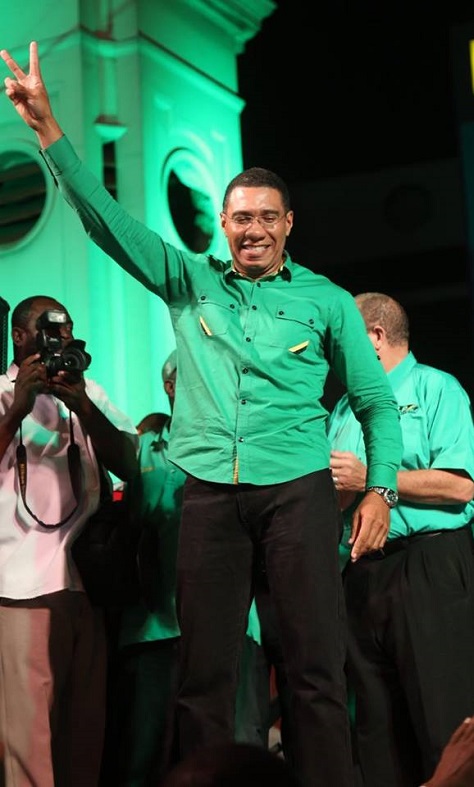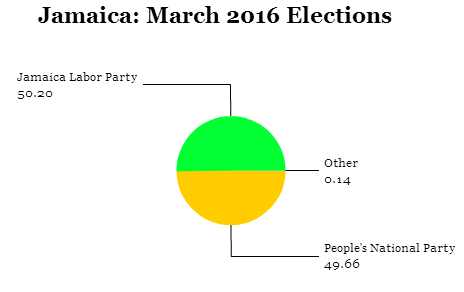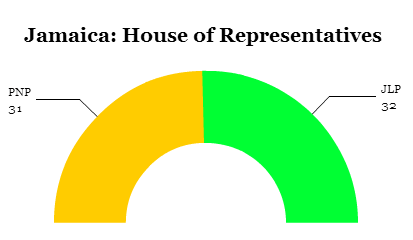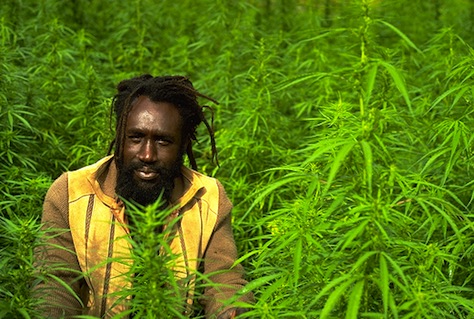
It’s not just voters in Spain, Ireland and Greece who are weary of austerity economics.![]()
![]()
![]()
![]()
Voters in Jamaica last month narrowly ejected their prime minister, Portia Simpson-Miller, giving opposition leader Andrew Holness and the nominally center-right Jamaica Labour Party a razor-thin 32-31 majority in the House of Representatives. Though Jamaican politics has been famous since the 1970s for its polarization, Holness will govern with the narrowest margin in the House since 1949.
What he does with his mandate could matter not only for Jamaica, but the entire Caribbean.
Simpson-Miller, who took power in 2012 and secured yet another IMF bailout in 2013 for the debt-plagued island, marked some success in bringing the country’s debt-to-GDP ratio down from 140% to around 125%. For now, Holness is working with IMF officials, but he won election after pledging to spend more revenues on health care, education and stimulating the economy, part of a generous and populist 10-point plan that will be difficult for him to enact under current fiscal restraints.
The Caribbean’s self-cannibalizing debt crisis
Holness will find himself in a trap all too common in the 21st century Caribbean, where manufacturing, tourism and, in some cases, modest oil production, have not been sufficient to boost economies and incomes. Without higher GDP growth, Holness will face two difficult options. If his government spends too much, he’ll unwind the careful work of his predecessor and send Jamaican debt levels spiraling upwards again. If Holness spends too little, he will alienate the electorate that gave him a majority and that, like Americans and Europeans, are weary of roller-coaster economic uncertainty and a widening inequality gap.
It’s a story that is increasingly familiar across the region and, today, it’s not just Jamaica that is falling into the debt trap. Barbados and Grenada have both marked 60% increases in their debt/GDP ratios in the last 15 years, and the Bahamas, Bermuda and other countries, not typically associated with imprudence, are also struggling with rising debt. Islands like Martinique and Guadeloupe thrive as fossils of France’s colonial empire, thriving due to hefty subsidies from Paris. Trinidad and Tobago, only recently flush with the promise of offshore oil drilling, has watched its expectations plummet with global oil prices. Puerto Rico, a commonwealth of the United States, endures a grinding debt default amid prolonged economic misery with little hope that legislative action can fix its economy. Despite years of advanced warning, neither Democrats nor Republicans have the inclination or ability to provide relief from Capitol Hill.
Taken together, the spiraling debt and economic stagnation of the Caribbean represents an overlooked security challenge in the years ahead that China, Russia or even the Middle East might exploit.
Cuba, Cuba, Cuba
Jamaica’s election didn’t generate the same excitement in the American media as U.S. President Barack Obama’s historic trip this week to Havana, the first since Calvin Coolidge visited in 1928. But it’s only the third time that Obama himself has traveled to the Caribbean at all – he visited Jamaica in April 2015, and he went to Trinidad and Tobago in 2009, when it hosted the 5th Summit of the Americas. Continue reading Beyond Cuba: why Caribbean debt crisis could become American security crisis




